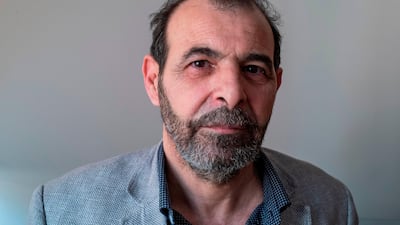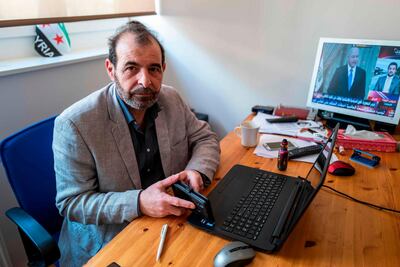Decades of torture and abuse under the Assad regime comes under trial in a German court Thursday, more than nine years after the start of the brutal Syrian civil war.
A former colonel in the Syrian Army, Anwar Raslan will be in the dock, accused of involvement in the murder of 58 demonstrators in 2011 and the torture of 4,000 others in the Al Khatib detention centre in Damascus.
Syrian activists say the case is a landmark moment for victims of state-sponsored terror and crimes against humanity who refuses to be silenced.
Watching closely will be the veteran Syrian human rights lawyer Anwar Al Bunni, who has lived as a refugee in Berlin since 2014 and has spearheaded efforts for justice.
A prominent critic of the Assad regime, Mr Bunni is director of the Syrian Centre for Legal Studies and Research. His brother, Akram, is a prominent dissident who has suffered frequent imprisonment and also fled to Germany.
For Mr Bunni the trial is an important through after a lifetime of fighting to expose and prevent the harsh system of repression within his homeland. Mr Bunni, who is in his sixties, describes the trial as “new step” for Syrian dissidents. “The victims will face the perpetrators.”
It was he who first spotted Mr Raslan in a shop in Germany - the pair had a history that stretched back a decade or more.
At the demise of the so-called Damascus Spring that briefly flourished after President Bashar Al-Assad succeed his father Hafez, Mr Bunni was arrested by Mr Raslan. The regime courts sentenced him to five years in jail.
Now with the tables turned, the Syrian lawyer insists the case is not personal.
"My enemy is the system, a regime," he told The National ahead of the trial.
“It’s about we can prove through this trial in front of all the world the system of this regime. How all these high ranking [officials who were] involved in committing these kind of crimes against humanity,” he said.
“It’s not about him, I don’t care about one person but I will use this situation to prove in front of all the world it’s system, it’s regime. It’s not about one person committing crimes.”
He says he does not harbour any anger against Mr Raslan, who defected from the Syrian military in 2012 and defected himself to Germany in 2014. Also set to appear in court is Eyad Al Gharib who is accused of abetting the torture.
The veto of Russia, a key ally of the regime of President Assad, has proven to be an extremely powerful tool in preventing the Syrian government from being held to account.
“This trial is of considerable importance worldwide. The power relations currently at play in the UN Security Council prevent the International Criminal Court or a special tribunal from taking action. This means that for the time being, the only proceedings possible must be conducted on the principle of universal jurisdiction,” said Wolfgang Kaleck, General Secretary of the European Centre for Constitutional and Human Rights, which is assisting 16 Syrian torture victims in the proceedings which could last two years.
“The trial will provide an overall picture of the crimes committed by the Syrian Government. This knowledge can then be used by others and in other trials, whether on the regional or the international level. Further arrest warrants are needed, such as that issued by the Federal Court of Justice against Jamil Hassan, the former head of the air force intelligence service in Syria,” Mr Kaleck said.
The case also means more people will be aware of the work he is doing, something he has happier about than the trial taking place itself.
He also adds that he know there are bigger targets to go after such as Mr Raslan’s superiors. Mr Bunni says his focus is on the high-ranking officials who “think it's ok to continue to commit the crimes”.
"My plan is to have justice in Syria for Syrians. Our work here in Europe is not really to make European justice authorities responsible towards the accountability of the crimes in Syria," he told The National. "We want to send a message to the criminals that their immunity time is over. We want to send a hope message to the victims that there is a way to reach justice without feeling disappointed or hopeless."
He says he wants to send a message to the political world that the Assad regime “must face justice before anything”.



